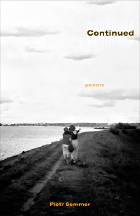Peter Sommer’s Continued is interesting from many different perspectives. It is a selected poems that moves backward from the present toward his youth, something I recall only the late
Sommer’s name itself has been popping up a lot lately, making one wonder if it is doing so because he is very good, or because he is so very close, having taught at Amherst, Mount Holyoke, Wesleyan, Notre Dame, Indiana & Nebraska (Lincoln). Someone like Czeslaw Milosz benefited enormously from moving west, being translated by a first-rate poet like Bob Hass, giving the School of Quietude a kind of political legitimacy that in reality had nothing to do with its own roots, traditions or impulses. The fact that few of the 50 or so writers I knew in
Such little qualms dissolve very quickly reading this book, which is terrific. For the most part, it reads like terrific poetry period, rather than, say, just “terrific poetry in translation,” which is something else altogether. Here is “Proofs”:
Don’t worry about commas, all these
punctuation marks, colons, semi-colons
and dashes which you so scrupulously
specify will be, thanks to a proof-
reader’s inattentiveness, left out; the rhythm
of your sentence, your thinking, your language
will prove less important than
you expected, or maybe than you wanted.
That was nothing but wishful thinking –
you won’t be read to the music of speech
but to the hubbub of things.
One might read this as kin to the soft surrealism of Simic or Tate, but that seems to me overlaying the American context just as has been done with (or to) Milosz. Ashbery, in his jacket blurb, makes a point of invoking Frank O’Hara (whom Sommer has translated), and one might imagine that, say, in the book’s first poem (which, in theory at least, may be the newest one here):
Morning on Earth
Morning on earth, light snow, and just when
it was so warm, practically spring.
But the thermometer in the kitchen window
says seven degrees,
and pretty sunny.
Here’s
the electric company guy I like,
and no sign of the gas guy
I can’t stand.
And all of a sudden two Misters M. –
one I’ve fallen for, the other
a bit of a hotshot –
coming back, both nine years old,
just passing the jasmine bush,
a huge bouquet of sticks.
Behind the door
the dog’s excited, nothing’s
at odds with anything.
It’s relatively rare for a poem, even now, to show that the poet understands that it need do nothing at all, but here one is. “Short Version” has more of the tone of one of O’Hara’s set pieces:
I couldn’t be with you when you died.
Sorry, I was toiling day and night
on the title of a poem I didn’t have time to show you.
You really would have liked it.
Even if the poem itself
wasn’t the strongest, I was counting on the title
to prop it up from above,
to set it right even, and to sanction it
as sometimes happens, I don’t know
if the nurse ever had time
to give you the news
because when I called it was
already late, though finally
she took the whole message.
Particularly given Sommer’s background, it’s easy to read him as tho such American influences were in fact just that, as if he were any young poet to have risen up in






